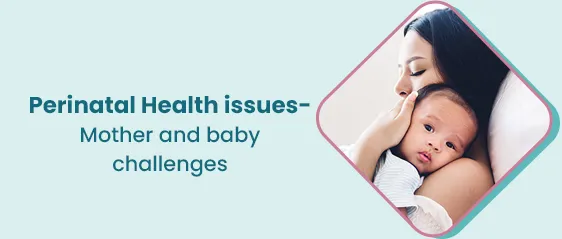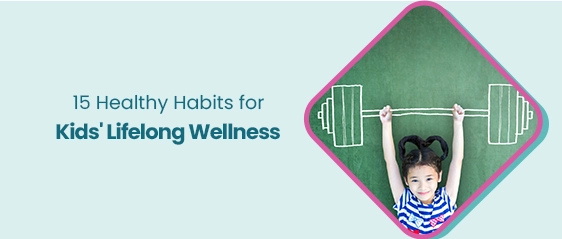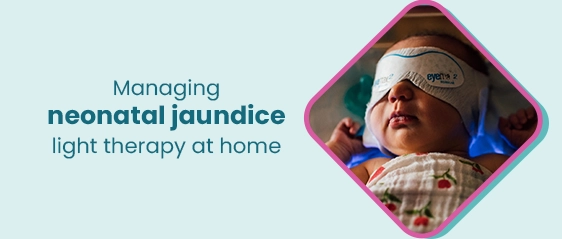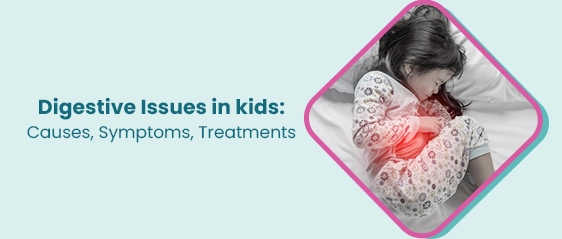Perinatal Health: Mother and Baby Challenges
- 14 Aug 2023
Perinatal health issues refer to medical challenges that can affect both the mother and the newborn immediately before, during, and shortly after childbirth. During this phase, both the mother and the baby face various challenges that can impact their well-being. Understanding these challenges is essential for ensuring a healthy and safe perinatal experience. Here are some of the challenges faced by both the mother and the baby during this sensitive period:
Challenges for the Mother:
- Pregnancy-Related Complications: Conditions like gestational diabetes, preeclampsia (high blood pressure during pregnancy), and placenta-related issues can have an impact on the mother's health and raise the possibility of health issues.
- Labor and Delivery Challenges: Prolonged labor, difficult childbirth, and the need for medical interventions like cesarean sections can pose challenges during the delivery process.
- Postpartum Depression: Hormonal changes and the demands of caring for a newborn can lead to postpartum depression, affecting the mother's mental and emotional well-being.
- Physical Recovery: The body undergoes significant changes during pregnancy and childbirth. Mothers need time to recover from labor and delivery, which can include healing from episiotomies, tear repairs, or cesarean incisions.
- Breastfeeding Challenges: Establishing successful breastfeeding can be challenging due to issues like latch problems, engorgement, and discomfort.
Challenges for the Baby:
- Premature Birth: Babies born before completing a full term can face various health challenges due to underdeveloped organs and systems.
- Low Birth Weight: Inadequate fetal growth can result in low birth weight, leading to feeding difficulties and a higher risk of infections.
- Respiratory Distress Syndrome (RDS): Premature babies often have underdeveloped lungs, leading to breathing difficulties and the need for respiratory support.
- Neonatal Jaundice: Elevated bilirubin levels can cause yellowing of the baby's skin and eyes, requiring monitoring and sometimes phototherapy.
- Birth Defects: Structural or functional abnormalities present at birth can range from mild to severe and may require immediate medical attention.
- Infections: Newborns are vulnerable to infections acquired during birth or in the early days of life, especially if the mother had an infection during pregnancy.
- Feeding Difficulties: Some babies may struggle with breastfeeding due to weak sucking reflexes or other issues.
Regular prenatal care, open communication with healthcare professionals, and seeking help when needed are crucial to ensuring the mother's and baby's health and well-being during this significant phase of life.
Causes of Perinatal Health Issues :
- Gestational Diabetes: Gestational diabetes arises when the body is unable to produce enough insulin to meet the growing nutritional needs of pregnancy. This can result in high levels of sugar in the blood, potentially compromising both the mother's and the baby's health.
- Preeclampsia: Preeclampsia is characterized by high blood pressure and damage to organs, usually occurring after the 20th week of pregnancy. It can impact the mother's kidneys, liver, and other organs, potentially leading to serious complications.
- Placenta-related Issues: Conditions like placenta previa (placenta covering the cervix) or placental abruption (placenta detaching from the uterine wall) can cause bleeding and complications during pregnancy.
- Infections: Infections such as urinary tract infections, sexually transmitted infections, and group B streptococcus can be unhealthy for both the mother and the child if untreated.
- Preterm Labor: Certain factors, such as multiple pregnancies, infections, and previous preterm births, can increase the risk of preterm labor, leading to premature birth.
- Obesity and Overweight: Being overweight or obese during pregnancy increases the chance of developing gestational diabetes, preeclampsia, and difficulties during labor and delivery.
- Maternal Age: Teenage pregnancies and pregnancies in women over the age of 35 can be associated with higher risks of certain complications, such as preeclampsia and genetic abnormalities.
- Chronic Medical Conditions: Pre-existing medical conditions like hypertension, diabetes, thyroid disorders, and autoimmune diseases can exacerbate during pregnancy and impact both the mother's and the baby's health
- Smoking, Alcohol, and Substance Abuse: Using tobacco, alcohol, or illegal drugs during pregnancy causes a variety of health issues for both the baby and the mother.
- Poor Nutrition and Lack of Prenatal Care: Inadequate nutrition and lack of proper prenatal care can contribute to various complications and health issues during pregnancy.
Conclusion
It's important for pregnant women to receive regular prenatal care, follow medical advice, maintain a healthy lifestyle, and promptly address any health concerns with their healthcare provider. By identifying and addressing these causes early, many perinatal health issues can be managed or mitigated to ensure the well-being of both the mother and the baby.
To confidently face these challenges and ensure the best care, considering a consultation with the highly skilled pediatricians,neonatologists atMedicover Hospital is a crucial move for a positive perinatal journey for you and your baby. We understand how important perinatal health is and the unique needs of pregnant mothers and newborns. Our experienced team of specialists is devoted to providing complete support and guidance throughout this important phase.
Frequently Asked Questions
1. What is perinatal health?
Perinatal health refers to the health of both the mother and the baby during the critical period surrounding childbirth, encompassing the time just before, during, and shortly after delivery.
2. What are common perinatal health issues for mothers?
Common perinatal health issues for mothers include gestational diabetes, preeclampsia, infections, placental problems, and complications related to chronic medical conditions.
3. What challenges can premature birth pose to a baby's health?
Premature birth can lead to underdeveloped organs, respiratory distress syndrome, low birth weight, and increased vulnerability to infections for newborns.
4. How can infections during pregnancy affect both the mother and the baby?
Infections during pregnancy can increase the risk of preterm labor, birth defects, and health issues for both the mother and the baby.
5. What is neonatal jaundice, and how is it treated?
Neonatal jaundice is characterized by yellowing of a baby's skin and eyes due to elevated bilirubin levels. It's often treated with phototherapy, which helps break down bilirubin.
6. What is the role of a neonatologist in perinatal health?
A neonatologist specializes in the care of newborns, especially those born prematurely or with complex medical conditions, ensuring their well-being during the perinatal period.
7. Can perinatal health issues be prevented?
While not all issues can be prevented, receiving proper prenatal care, maintaining a healthy lifestyle, and managing chronic conditions can reduce the risk of certain perinatal health problems.
8. What treatments are available for perinatal health issues in mothers?
Treatments include medications, monitoring, bed rest, induction, or cesarean section based on the specific condition, to ensure the mother's and baby's well-being.
9. How are preterm labor and birth managed?
Preterm labor might be managed with medications to delay labor. In severe cases, early delivery through induction or cesarean section might be necessary.
10. What should pregnant individuals do to ensure a healthy perinatal experience?
Regular prenatal care, open communication with healthcare providers, a balanced diet, regular exercise, avoiding harmful substances, and seeking medical attention for any concerns are essential steps





